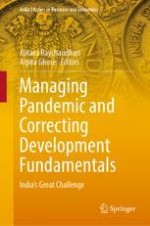2023 | OriginalPaper | Buchkapitel
Exploring the Significance of Food Insecurity Mediated Poverty and Low Productivity Traps: Furthering Policy by Reconciling Secondary Data with Primary Survey
verfasst von : Siddhartha Mitra, Paramita Bhattacharya
Erschienen in: Managing Pandemic and Correcting Development Fundamentals
Verlag: Springer Nature Singapore
Aktivieren Sie unsere intelligente Suche, um passende Fachinhalte oder Patente zu finden.
Wählen Sie Textabschnitte aus um mit Künstlicher Intelligenz passenden Patente zu finden. powered by
Markieren Sie Textabschnitte, um KI-gestützt weitere passende Inhalte zu finden. powered by
